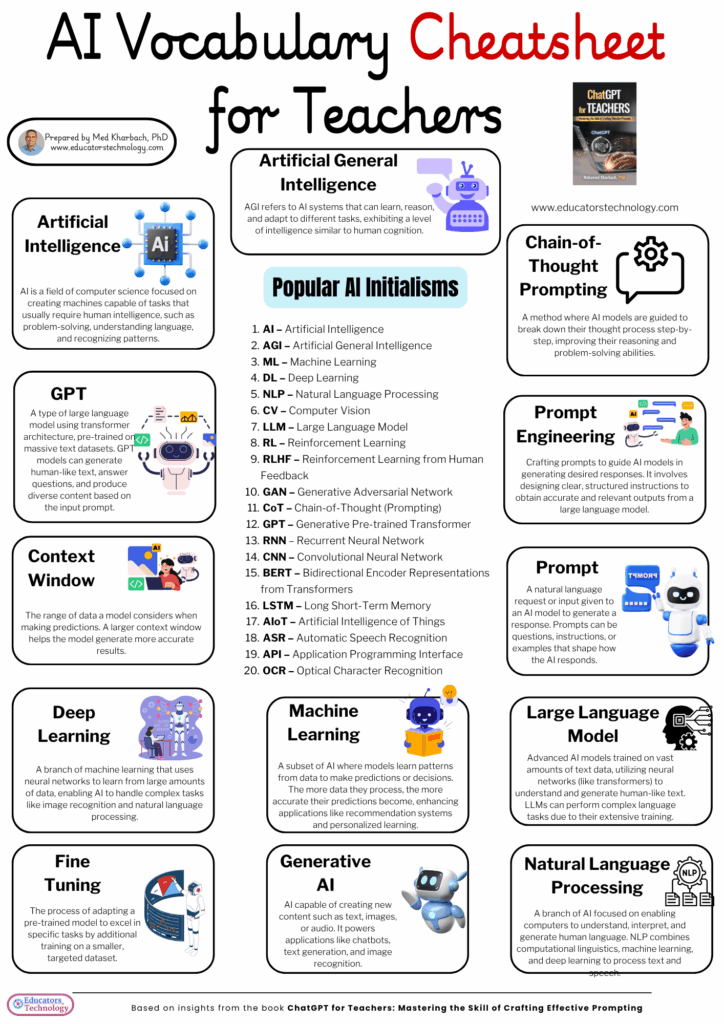Artificial intelligence has quickly become part of classroom conversations, from lesson planning to assessment design to professional learning. But the language of AI can feel like a maze. Between acronyms like NLP, AGI, and LLM, and terms such as fine-tuning or prompt engineering, it’s easy to lose track of what each one means or why it matters for educators.
That’s what inspired me to create the AI Vocabulary Cheatsheet for Teachers, a one-page reference that breaks down the essential AI concepts educators come across every day.
Why a Vocabulary Cheatsheet Matters
When teachers understand the language of AI, they gain agency in the discussion. Instead of relying on broad explanations, they can ask sharper questions, assess tools more critically, and connect AI concepts to their teaching goals.
For example, when you hear “context window,” you’ll know it refers to how much information a model can consider at once when generating a response. That small piece of knowledge helps you understand why a chatbot might lose track of a long conversation or miss earlier details. Similarly, knowing what “fine-tuning” means clarifies how developers train AI models to perform specific tasks, like grading essays or generating lesson ideas, on smaller, focused datasets.
Related: AI Literacy and Its Foundations
What’s Inside the Cheatsheet
The visual brings together the most common AI terms teachers encounter, grouped in simple language. Here are a few highlights:
- Artificial Intelligence (AI): The broader field focused on building systems that can reason, solve problems, and recognize patterns.
- Machine Learning (ML): The part of AI that helps machines learn from data and make predictions.
- Large Language Models (LLMs): The advanced models, such as ChatGPT, that generate text, answer questions, and assist with teaching or writing.
- Generative AI: Tools capable of producing new content (e.g, text, images, or even videos) from existing data.
- Prompt Engineering: The practice of crafting effective inputs to guide AI responses toward clear, useful outputs.
- Reinforcement Learning (RL): The method where models learn through feedback, similar to how students improve when they receive constructive comments.
- Deep Learning: A subset of machine learning that mimics how human brains process patterns through multiple layers of neural networks.
The cheatsheet also includes a quick list of 20 popular AI initialisms: a simple reference you can keep handy during professional development sessions, workshops, or AI-related discussions.
How to Use It
Use the cheatsheet as a starting point for professional conversations or collaborative planning. Print it for your staff room, share it during PD sessions, or add it to your classroom technology binder. It’s also useful when exploring new AI tools, understanding what “NLP” or “RLHF” means helps you evaluate features with greater confidence.
For educators leading AI-focused workshops, the visual works well as an introductory slide or discussion starter. You can ask participants to pick one term they already use, one they’ve heard but can’t define, and one they’re curious to learn about. This simple activity opens rich conversations about AI’s growing role in education.
A Final Thought
Teachers use AI daily, whether through grading tools, translation apps, or adaptive learning platforms, so understanding the language behind these technologies strengthens professional literacy. The goal of this cheatsheet is simple: make AI talk feel natural in staff rooms and classrooms alike. Once teachers grasp the terms, they can move beyond definitions and start shaping meaningful, ethical, and creative uses of AI in learning.

The post AI Vocabulary Cheatsheet for Teachers appeared first on Educators Technology.







